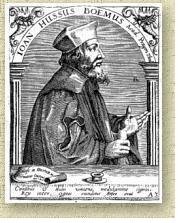 Jan was the son of poor people from Husinec in southern Bohemia, a region with a mixed Czech and German population. He adopted the name "Hus" from his birthplace.
Jan was the son of poor people from Husinec in southern Bohemia, a region with a mixed Czech and German population. He adopted the name "Hus" from his birthplace.Czech religious reformer, b. 1372/73 (Husinec, Bohemia), d. 6 July 1415 (Konstanz (Constance), Germany).
 Jan was the son of poor people from Husinec in southern Bohemia, a region with a mixed Czech and German population. He adopted the name "Hus" from his birthplace.
Jan was the son of poor people from Husinec in southern Bohemia, a region with a mixed Czech and German population. He adopted the name "Hus" from his birthplace.
Despite his poor upbringing Hus could enrol in 1390 at the University of Prague, where he received his Masters degree in 1394 and joined the teaching staff. He must have been a gifted academic, for he became Dean of the Faculty of Philosophy in 1401.
Prague and the university in particular were under strong German influence, and the German and Czech masters were in strong opposition to each other. About one half of Bohemia was owned by the Catholic church, and peasants on church owned land were labouring under the highest taxes. A strong Czech nationalist movement therefore took the form of a movement for church reform, while the German position opposed change.
In 1401 the writings of the English philosopher Wycliffe arrived in Prague and were taken up eagerly by the Czech nationalists. Hus did not follow all of Wycliffe's religious arguments but endorsed his call for reform of the clergy. But the university was controlled by the Germans - the German masters had three votes, the Czech masters only one -, and the German master Johann Hübner had Wycliffe's writings condemned as heretical in 1403. Hus therefore had to express his position outside the university. In 1402 he was put in charge of the Bethlehem Chapel, an institution founded in 1391 by the nationalist reformed Jan Milic. While the university language was Latin, preaching at the Chapel was in Czech.
The Catholic church had been split by the Great Schism since 1378. A Council of Pisa was planned for 1409 to depose the two rival popes and elect a new one. Hus and the Czech masters supported the initiative, but the German masters sided with archbishop Zbynek of Prague, who was opposed to the Council. In response King Wenceslas suspended the university constitution and changed the voting rules, granting three votes to the Czech and one to the German masters. As a result many German masters left to find employment at German universities, and Jan Hus was elected rector of the university in 1409.
The Council of Pisa elected Alexander V, but the rival popes Gregory XII and Benedict XIII refused to resign. Zbynek, forced by the king to accept the legitimacy of Alexander V, managed through a substantial bribe to obtain a papal ban on preaching in private chapels; when Hus continued to preach in the Bethlehem Chapel he excommunicated him. The king again intervened and forced Zbynek to protect Hus from a trial at the Curia in Rome.
The year 1412 brought a new conflict with the introduction into Bohemia of new indulgences by the antipope John XXIII to finance his campaign against rival pope Gregory XII. (Traditional church practice during medieval times required absolution from a priest, contrition, and the purchase of an "indulgence" from an accredited agent before a person could feel free of guilt.) Hus denounced the practice, but Zbynek had died, and the king, who had authorized the sale and received part of the proceeds, refused to support him. The inactive trial against Hus was reopened, and the Curia excommunicated him again and interdicted (i.e. refused church sacraments to) all places that gave refuge to him.
Hus left Prague to spare the city from trouble and for the next two years lived in hiding in castles of Czech friends. In 1415 the Council of Constance was another attempt to end the Schism. The Holy Roman Emperor King Sigismund of Hungary offered him safe conduct, but the documents arrived two days late, and he was placed under arrest. He was allowed three public hearings but refused to recant. Sentenced to death, he was burnt at the stake. his last statement, signed by him, reads:
Hus' reform movement anticipated the reformation of Martin Luther by a century. Both movements aimed at ending the secular power of the Catholic church - a feudal landlord that was often more oppressive than the secular nobility - and therefore received support from many noblemen. Both expressed their aim through religious critique. Hus paid for it with his life, but the movement continued, and the "Hussites" were eventually successful. After Hus' death Czech noblemen published a protest and offered protection from prosecution to anyone accused of following Hus' preachings.
The Hussites abandoned the Latin liturgy in favour of Czech and formulated the Four Articles of Prague:
Sigismund persecuted the Hussites and organised several military crusades against Prague and its allied cities but failed to take Prague. Pope Martin V organized another unsuccessful crusade. Peace negotiations began in 1431, and the Compact of Iglau of 1436 accepted all four articles, ending the economic and political power of the Catholic church in Bohemia.
Unlike the followers of Luther the Hussites never broke with the Catholic church completely. Their independent Bohemian Catholic church was reunited with the Roman Catholic church in about 1620.
Workman, H. B. and R. M. Pope eds. (1904), The Letters of John Hus, Hodder and Stoughton, London, pp. 275-276; text modernized by J. S. Arkenberg, Dept. of History, Cal. State Fullerton; http://www.fordham.edu/halsall/mod/1415janhus.html (accessed 11 March 2004)